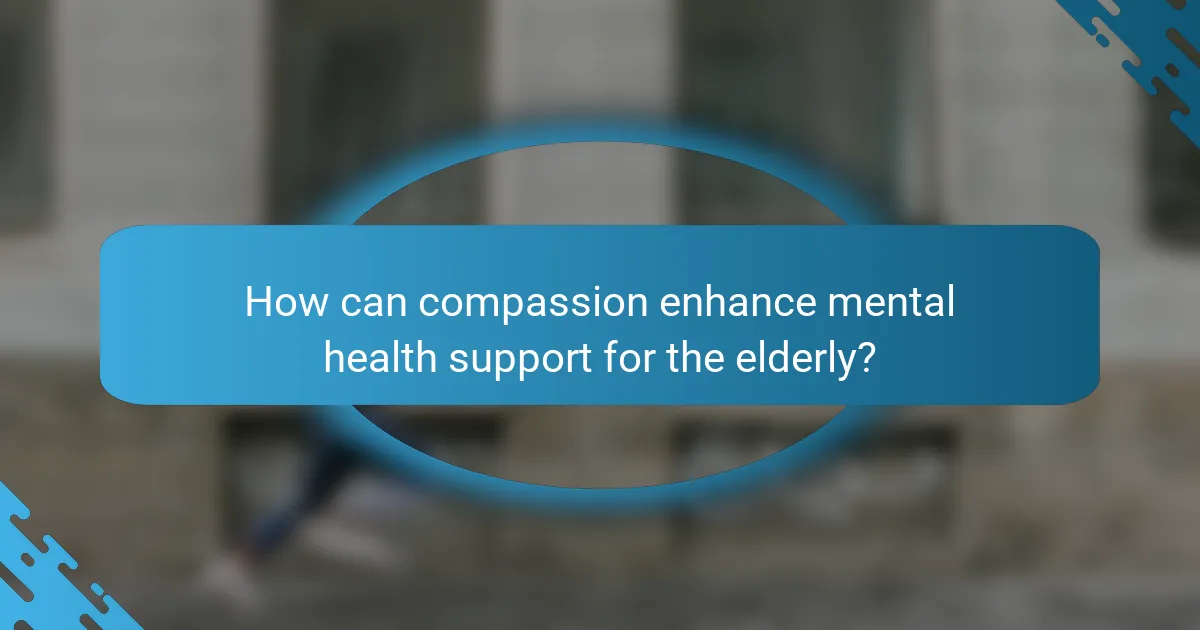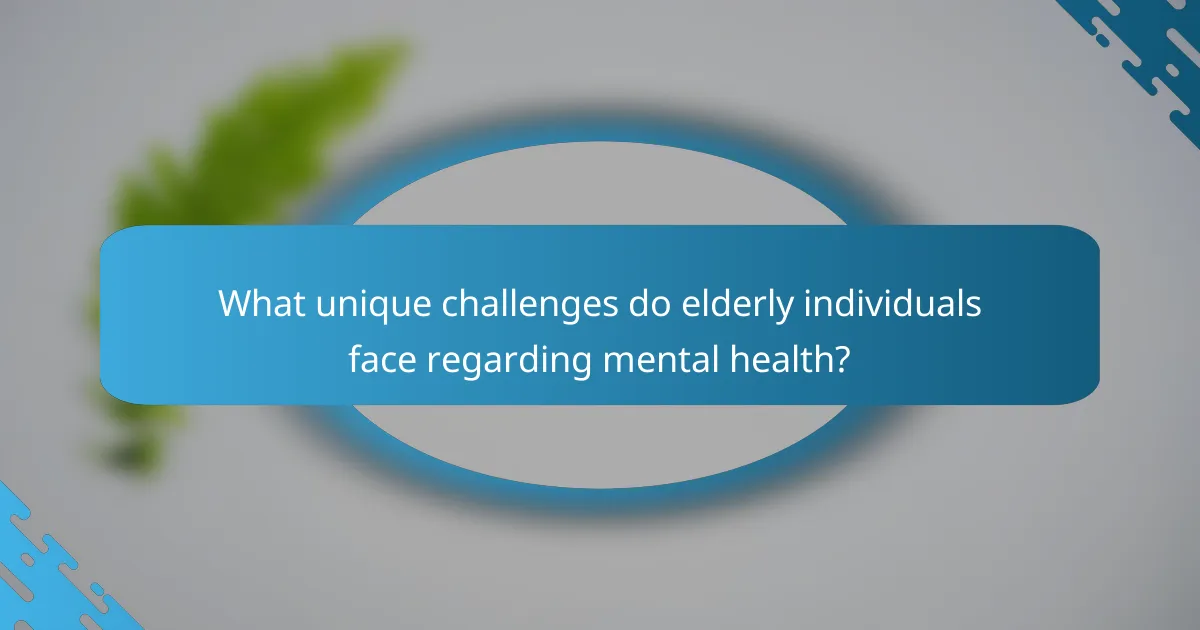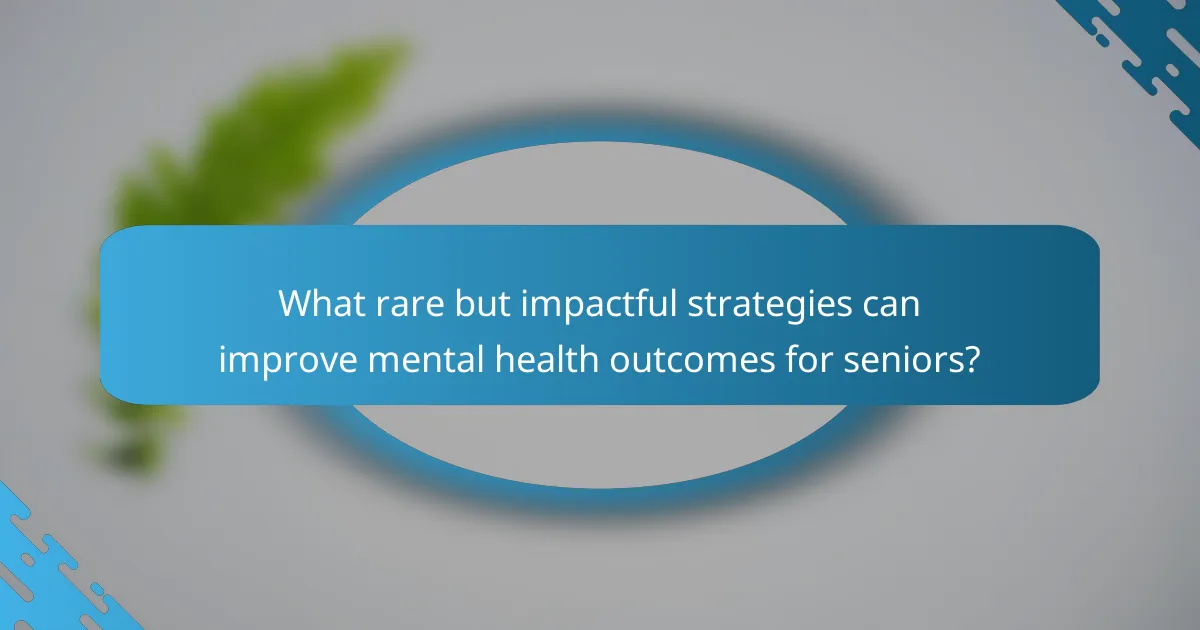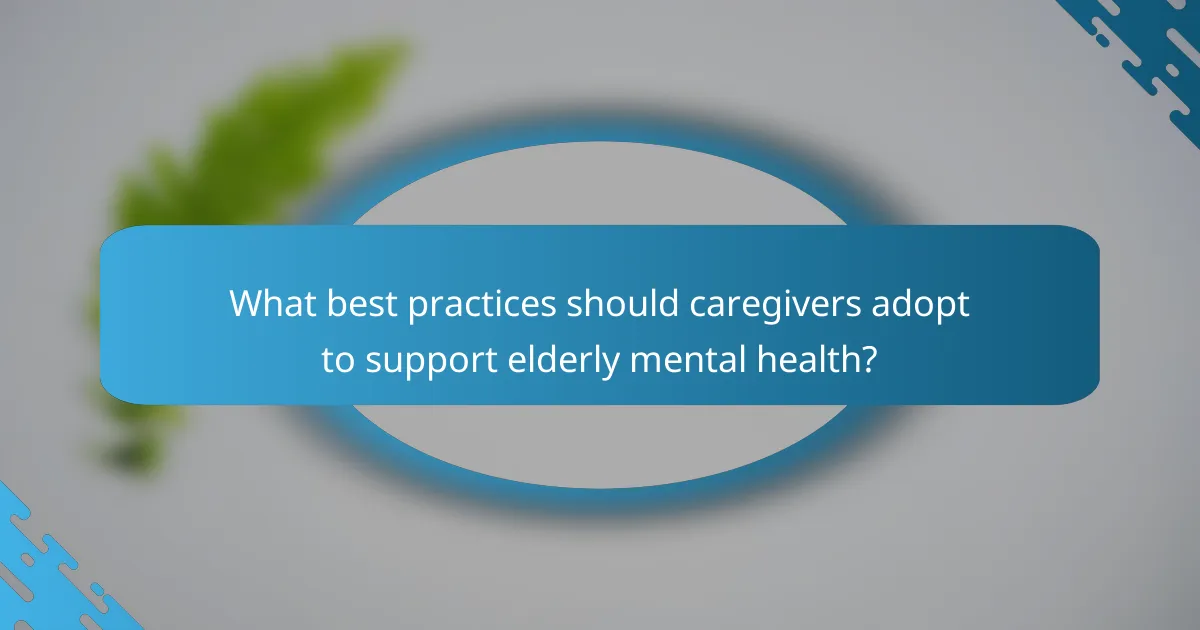Enhancing mental health support for the elderly is crucial in addressing challenges like isolation and cognitive decline. Compassion fosters connection and understanding, promoting emotional well-being. Community involvement creates supportive networks, empowering seniors through shared experiences and activities. Caregivers can adopt compassionate communication and regular assessments to improve overall mental health outcomes.

How can compassion enhance mental health support for the elderly?
Compassion significantly enhances mental health support for the elderly by fostering connection and understanding. It promotes a sense of belonging, reducing feelings of isolation. Empathy-driven interactions can lead to improved emotional well-being and resilience. Community involvement further amplifies these benefits, creating supportive networks that cater to the unique needs of older adults. Studies show that compassionate care can lower anxiety and depression rates among the elderly, enhancing their overall quality of life.
What are the key components of compassionate care?
Compassionate care involves understanding, empathy, and support tailored to individual needs. Key components include active listening, emotional support, and community engagement. Active listening fosters trust and understanding, while emotional support addresses mental health needs. Community engagement creates a supportive environment, enhancing overall well-being. These components are essential for improving mental health support for the elderly.
How does active listening impact elderly mental health?
Active listening significantly enhances elderly mental health by fostering connections and reducing feelings of isolation. This practice encourages open communication, allowing seniors to express their thoughts and emotions, which can alleviate anxiety and depression. Studies show that active listening can improve cognitive function and emotional well-being in older adults. By creating a supportive environment, communities can enhance mental health outcomes for the elderly, promoting a sense of belonging and purpose.
What role does empathy play in caregiver interactions?
Empathy is crucial in caregiver interactions as it fosters trust and enhances communication. It allows caregivers to understand the emotional and psychological needs of the elderly, leading to better support. Compassionate interactions can significantly improve mental health outcomes, reducing feelings of isolation and anxiety among seniors. Studies show that empathetic caregiving correlates with higher satisfaction rates in elderly care, ultimately promoting a healthier community environment.
What are the benefits of community involvement in mental health support?
Community involvement in mental health support enhances emotional well-being, reduces isolation, and fosters resilience among the elderly. Engaging with community resources provides access to social networks, which can alleviate symptoms of depression and anxiety. Studies show that elderly individuals who participate in community activities experience a 30% improvement in mental health outcomes. Additionally, community support encourages the sharing of experiences, creating a sense of belonging that is crucial for mental health. This collaborative approach not only empowers seniors but also strengthens the overall community fabric.
How can social networks reduce feelings of isolation?
Social networks can significantly reduce feelings of isolation among the elderly by fostering connections and providing support. They offer platforms for interaction, enabling seniors to engage with family and friends, share experiences, and participate in communities that align with their interests. Studies show that active social network use correlates with improved mental health outcomes for older adults, reducing loneliness and enhancing overall well-being. By facilitating compassion and community, social networks play a crucial role in enhancing mental health support for the elderly.
What community programs are effective in supporting elderly mental health?
Community programs that effectively support elderly mental health include social engagement initiatives, mental health workshops, and peer support groups. These programs foster connection, reduce isolation, and enhance emotional well-being. For example, social engagement initiatives like community centres offer activities that promote interaction among seniors. Mental health workshops provide education on coping strategies and resources, while peer support groups create safe spaces for sharing experiences. Research shows that participation in these programs significantly improves mental health outcomes for the elderly, reducing symptoms of depression and anxiety.

What unique challenges do elderly individuals face regarding mental health?
Elderly individuals face unique challenges regarding mental health, including social isolation, cognitive decline, and stigma. Social isolation can lead to feelings of loneliness, significantly impacting mental well-being. Cognitive decline often results in increased anxiety and depression, making it difficult for seniors to engage with their communities. Stigma surrounding mental health issues can prevent elderly individuals from seeking help, exacerbating their struggles. Enhancing mental health support through compassion and community engagement is essential for addressing these challenges effectively.
How does age-related stigma affect mental health treatment?
Age-related stigma significantly hinders mental health treatment for the elderly by fostering isolation and discouraging them from seeking help. This stigma often leads to misconceptions about aging and mental health, resulting in decreased access to necessary support. Compassionate community initiatives can mitigate these effects by promoting understanding and encouraging open dialogues about mental health. As a result, enhanced mental health support systems can empower elderly individuals, improving their overall well-being.
What are the unique mental health disorders prevalent among the elderly?
Elderly individuals often experience unique mental health disorders such as depression, anxiety, and dementia. These conditions can arise due to factors like social isolation, chronic illness, or loss of loved ones. Depression affects approximately 7% of older adults, while anxiety disorders can impact around 10%. Dementia, including Alzheimer’s disease, is prevalent in about 10% of those aged 65 and older. Community support and compassionate care play crucial roles in enhancing mental health for this demographic.
How does depression manifest differently in older adults?
Depression manifests differently in older adults, often presenting as irritability, fatigue, or changes in sleep patterns rather than typical sadness. This demographic may also experience cognitive decline, making it harder to recognize depressive symptoms. Social isolation exacerbates these symptoms, highlighting the need for enhanced mental health support through community engagement and compassionate care. Older adults may also show unique attributes such as an increased focus on physical health issues, which can mask underlying depression. Understanding these manifestations is crucial for effective intervention and support.
What cognitive issues are commonly observed in the elderly?
Common cognitive issues in the elderly include memory loss, difficulty concentrating, and challenges with problem-solving. These issues can stem from conditions like dementia or Alzheimer’s disease, affecting mental health significantly. Promoting community support and compassion can enhance mental well-being in this demographic. Studies show that social engagement reduces cognitive decline, highlighting the importance of community resources.

What rare but impactful strategies can improve mental health outcomes for seniors?
Emphasizing compassion and community can significantly enhance mental health outcomes for seniors. Strategies include fostering intergenerational connections, which reduce loneliness and promote emotional well-being. Additionally, community-based support groups provide shared experiences that empower seniors. Activities like art therapy and mindfulness practices offer unique benefits, improving cognitive function and emotional resilience. Integrating these approaches creates a holistic support system that addresses the rare but impactful needs of the elderly.
How can technology facilitate mental health support for the elderly?
Technology enhances mental health support for the elderly by providing accessible resources and fostering community connections. Telehealth services allow seniors to consult mental health professionals remotely, reducing barriers to access. Mobile applications offer cognitive behavioural therapy tools, mood tracking, and mindfulness exercises tailored for older adults. Virtual support groups create a sense of belonging, helping to combat isolation. Smart home devices can monitor well-being and alert caregivers to potential issues, ensuring timely intervention. Overall, these innovations promote mental wellness through convenience and community engagement.
What are the benefits of teletherapy for seniors?
Teletherapy provides seniors with accessible mental health support, enhancing their well-being. It offers convenience, reducing barriers like mobility issues. Teletherapy fosters connection, allowing seniors to engage with compassionate professionals from home. This unique approach can lead to improved mental health outcomes.
How can mobile apps aid in mental health monitoring?
Mobile apps significantly enhance mental health monitoring for the elderly by providing accessible support and community engagement. They offer features like mood tracking, reminders for medication, and direct access to mental health resources. These tools foster a sense of connection, reducing feelings of isolation. A study found that 70% of elderly users reported improved mental well-being through regular app engagement. Additionally, unique attributes such as personalised feedback and community forums further empower users in managing their mental health effectively.
What role do pets play in enhancing mental well-being for older adults?
Pets significantly enhance mental well-being for older adults by providing companionship, reducing loneliness, and encouraging physical activity. Studies show that interaction with pets lowers stress levels and improves mood. For example, pet ownership can lead to a 30% reduction in depression symptoms among seniors. Furthermore, caring for a pet fosters a sense of purpose and routine, which are vital for mental health. Engaging with animals also promotes social interactions, enhancing community connections and support networks.

What best practices should caregivers adopt to support elderly mental health?
Caregivers should adopt compassionate communication, social engagement, and routine mental health assessments to support elderly mental health. Encouraging participation in community activities fosters connection and reduces isolation. Regularly monitoring emotional well-being helps identify and address issues early. Providing a safe space for expression enhances trust and openness.
How can caregivers create a supportive environment?
Caregivers can create a supportive environment by fostering compassion and building a strong community. A compassionate approach enhances mental health support, making elderly individuals feel valued and understood. Establishing regular social activities encourages interaction, reducing feelings of isolation. Providing resources for mental health education empowers caregivers and families to recognise signs of distress. Regular check-ins and open communication ensure that elderly individuals feel heard and supported, reinforcing their sense of belonging.
What common mistakes should caregivers avoid?
Caregivers should avoid high expectations, neglecting self-care, and insufficient communication. These mistakes can hinder mental health support for the elderly.
High expectations may lead to frustration and burnout. Caregivers must recognise that progress can be slow and variable. Neglecting self-care can diminish caregivers’ ability to provide effective support. Prioritising personal well-being is essential for maintaining resilience.
Insufficient communication can create misunderstandings and reduce the quality of care. Engaging with the elderly and their families fosters a supportive environment. By avoiding these common mistakes, caregivers can enhance mental health support for the elderly through compassion and community.
How can ongoing education improve caregiver effectiveness?
Ongoing education significantly enhances caregiver effectiveness by improving skills, knowledge, and emotional support. Continuous training fosters empathy and understanding, enabling caregivers to address the complex mental health needs of the elderly. In addition, education promotes community engagement, creating a supportive network that benefits both caregivers and elderly individuals. Research shows that trained caregivers report higher job satisfaction and improved patient outcomes, ultimately leading to better mental health support for the elderly.
What are the signs that indicate a need for professional mental health intervention?
Signs that indicate a need for professional mental health intervention include persistent sadness, withdrawal from social activities, changes in appetite, and difficulty concentrating. These symptoms may signal underlying issues that require compassionate support and community resources. Recognising these signs early can enhance mental health support for the elderly, fostering a proactive approach to their well-being.